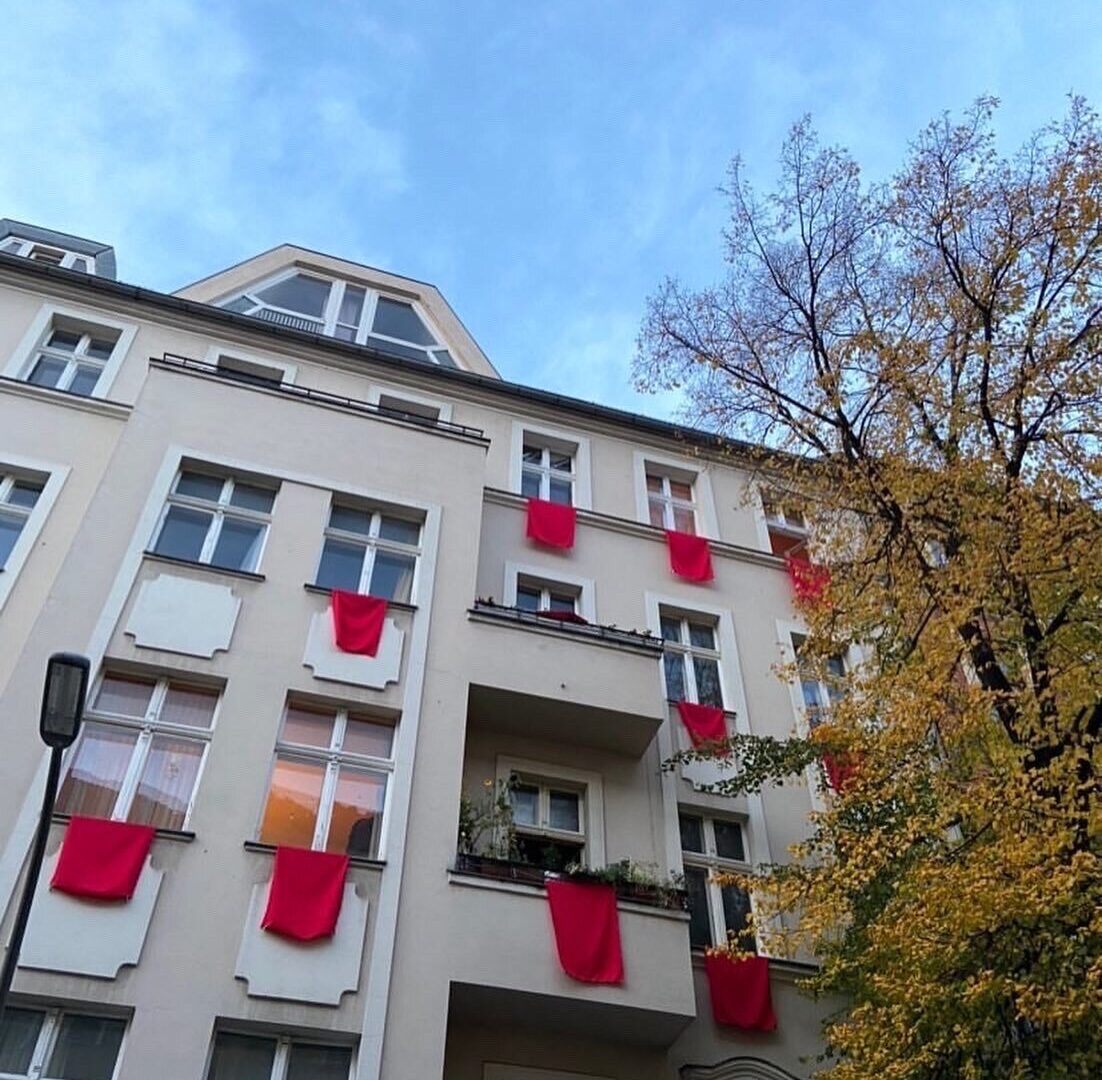Right of pre-emption? Organizing? District groups?!
Everything important about Heimstaden at a glance!
How the right of first refusal works and how differently the districts act is explained here! https://iniforum-berlin.de/2020/10/das-vorkaufsrecht-in-der-praxis/#more-2206
If you have received questionnaires from your Bezirksamt (district office), you should fill them out and send them back as soon as possible. They are very important for the so-called Wirtschaftlichkeitsprüfung (profitability check), which cooperatives also have to do. Simply put, a Wirtschaftlichkeitsprüfung is used to determine whether the purchase is worthwhile.
The Wirtschaftlichkeitsprüfung is only possible if the district office receives the information from all apartments in the house. Therefore, help your neighbors to fill out these forms – many people do not realize that most of the data is in the lease contract. In the districts it is now regulated that in each case two housing companies examine whether they want to step in as a so-called third party. You as a house community can also send cooperatives or the tenets syndicate your data in form of a portfolio and they can check whether the house fits to them.
If you have not heard from your district office, even though your house is located in a Millieuschutzgebiet (protection area), you should actively and persistently approach the building councilor and exert pressure. In some districts these offices have different names, for example “Amt für Stadtentwicklung” (Lichtenberg) or “Abteilung Immobilien, Umwelt und Tiefbau” (Steglitz-Zehlendorf). Start at the same time to determine the required data – time is running!
Either you have received a letter from the Bezirksamt (district office) or flyers from the network of Heimstaden houses. If you have not yet received a letter, but are noted on this card, it is relatively certain that your house is part of the Heimstaden package.
To be absolutely sure, please contact the district groups of the Heimstaden Network or the Grundbuchamt (land registry). They can tell you for sure who owns the house. However, it is possible that the purchase has not yet been registered.
Heimstaden Bostad AB is one of Sweden’s largest housing companies and operates throughout Europe. The largest part of the company is owned by the Norwegian “Fredensborg AS”, whose owner is the billionaire Ivar Tollefsen.
In Berlin, Heimstaden works closely with the “Skjerven Group GmbH” and operates with a double face (“good cop, bad cop”) and division of labor: The Skjerven Group has long been aggressive in increasing the value of its properties in Berlin, Heimstaden signals a moderate course. In practice, however, Heimstaden has so far refused to sign Abendwendungsvereinbarungen (restrictions under building law) when buying.
From Oslo and Malmö comes information about the usual procedures of profit-oriented real estate companies: neglect of the houses, conversion into private apartments and much more.
There is an interesting research by activist group “Hände Weg vom Wedding” about Heimstadens Partner Skjerven Group.
When houses are sold, Heimstaden has to get the money back for the investment: That means rising rents, saving on property management or conversion into condominiums. The negativ consequences for us tenants are therefore clear.. As the research of "Hände Weg von Wedding" shows. Also many tenants told us and reported: Heimstaden and its partner the Skjerven Group are well-known for this practice.
The pre-emption period runs until 23 November 2020, in some cases even earlier – so we have to act quickly!
First step – get to know each other in your house!
Ring the doorbell of your neighbors, inform them and organize a house meeting. In times of Corona it is best to go to the backyard with warm tea and blankets. You can find a brochure how this can work well here: deutsche-wohnen-protest.de/wp-content/u...
Set up a mailing list for the house and organize a group of active people. Get an email address for the house!
Second step – networking
Send one or more delegates to the Berlin-wide networking and local group meeting. In the Berlin-wide networking we determine central demands and coordinate the struggle of all houses, in the district groups is more space for questions and here we put pressure on the district administrations.
Third step – Right of first refusal or plan B
Find out if your house is located in an environmental protection area (Milieuschutzgebiet). You check it here for example: www.berliner-mieterverein.de/downloads/...
A. If your house is located in a protected area, the district can exercise the right of first refusal (link to question 1.). In this case it is important that you collect data about the house and the apartments (year of construction, number of residential units, number of commercial units, square meters, net cold rent, equipment). You can send this data, combined into a portfolio, proactively or on request to the housing companies and cooperatives as potential buyers. You can design the portfolio individually and briefly introduce yourself as a tenant.
B. If your house is outside of the milieu protection, then draw plan B (link to question plan B – fourth from below)
On the one hand we are networking throughout Berlin, on the other hand in the districts.
→ mg-berlin.org/heimstaden-vernetzung
districts:
For each district there is a distributor and a district group meeting. There we link the houses and put pressure on the district representatives. Here you can find all dates:
Ortsgruppe Mitte-Nordwest: Wedding, Moabit, Spandau
email distribution list: Wedding & Moabit: lists.bilgisaray.org/wws/subscribe/stop...
Spandau: lists.bilgisaray.org/wws/subscribe/stop...
Contact us: Heimstaden_Mitte@mg-berlin.org
Local group Pankow:
mailing list: lists.bilgisaray.org/wws/subscribe/stop...
contact: heimstaden_Pankow@mg-berlin.org
Local group Neukölln:
mailing list: lists.bilgisaray.org/wws/subscribe/stop...
Contact: heimstaden_Neukoelln@mg-berlin.org
Local group Friedrichshain-Kreuzberg:
mailing list: lists.bilgisaray.org/wws/subscribe/stop...
Contact us: Heimstaden_FH-KB@mg-berlin.org
Local group Tempelhof/Schöneberg & Steglitz:
mailing list: lists.bilgisaray.org/wws/subscribe/stop...
contact us: Heimstaden_TH-SB@mg-berlin.org
Berlin-wide:
There is a regular meeting to which one or more delegates from each house are invited. Here we decide on central demands and coordinate the work of the working groups (AGs) and district groups.
There are also three working groups: AG Public Relations takes care of press inquiries and social media channels, AG Actions organizes rallies, demos and other actions and AG Plan B makes plans for the houses Heimstaden bought and for which no right of first refusal was drawn. All AGs are open to tenants of Heimstaden houses.
AG actions (political work / right of first refusal):
Contact: aktionen.stopheimstaden@protonmail.com
mailing list: lists.riseup.net/www/subscribe/ag_aktio...
AG Public Relations (Press / Social Media / Public Relations):
Contact: presse.stopheimstaden@systemli.org
mailing list: lists.riseup.net/www/subscribe/ag_pr_he...
AG Plan B (Long-term receivables and networking):
contact us:
Email distribution list: ag-planb_heimstaden-vernetzung@lists.riseup.net
Self-organization and solidarity in one’s own home is the first step towards both effective protection and the ability to act against owner companies: join together as neighbors. Therefore we have to form house communities! Only together we are strong. The Tenants Union wants to support both the development of the houses communities and the formation of a Berlin-wide network against Heimstaden. There is a good tenancy law in Germany, but especially in Berlin investors are also particularly aggressive. If we join forces, it will help in any case.
Our proposal is therefore to build a Berlin-wide network of Heimstaden houses under the common label of a tenants’ union. The model is exactly such a union in Sweden, which also conducts collective bargaining with Heimstaden. Every year the organized tenants sit down with Heimstaden at the same table and push through a rent that is affordable for them.
The organization is to take place from bottom to top: The individual house communities come together in local group meetings, and collect and discuss the individual situation in the houses. Each house then chooses delegates who come together in local groups and who in turn send delegates to a central network. Here a common Berlin-wide strategy will be developed to stop Heimstaden! The flow of information takes place back to the local groups and house communities, where the decisions are made.
You can find the mailing list here: lists.riseup.net/www/subscribe/stopheim...
Please note that there are already over 500 tenants on the mailing list. Please send questions about your house or individual answers to us or the persons concerned, but not via the large distribution list!
Contact the AG Public Relations of the Stop Heimstaden Network: presse.stopheimstaden@systemli.org. They are looking forward to your invitations, pictures and videos!
This is bad but not the end. We are so many organized house communities that we can defend ourselves against Heimstaden if we stick together: Self-organization and solidarity in one’s own home is the first step towards both effective protection and the ability to act against owner companies.
We want to support you in building up the house communities as well as in the formation of a Berlin-wide network against Heimstaden. There is a good tenancy law in Germany, but especially in Berlin the investors are also particularly aggressive. If we join forces, it will help in any case.
Our proposal is therefore to build a Berlin-wide network of Heimstaden-Hausen under the common label of a tenants’ union (link to the self-image).
The model is exactly such a union in Sweden, which also conducts collective bargaining with Heimstaden. Every year, the organized tenants sit down with Heimstaden at the same table and negotiate a rent that is affordable for them.
The organization is to take place from bottom to top: The individual house communities come together in local group meetings, and collect and discuss the individual situation in the houses. Each house then chooses delegates who come together in local groups and who in turn send delegates to a central network. There, a common Berlin-wide strategy will be developed to stop Heimstaden! The flow of information takes place back to the local groups and house communities, where the decisions are made.

